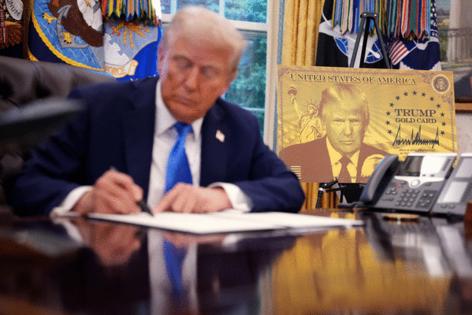Chamber of Commerce sues over Trump's $100,000 H-1B visa fee
Published in Business News
The nation’s largest business lobbying group sued the Trump administration over its changes to the visa system for skilled foreign workers, teeing up a fresh battle between corporate America and the president.
The U.S. Chamber of Commerce said in a lawsuit Thursday that it was illegal for President Donald Trump to slap a $100,000 fee on new H-1B visa applications because it overrides federal immigration law requirements. The group is seeking an injunction that blocks the charge from going into effect.
“The new $100,000 visa fee will make it cost-prohibitive for U.S. employers, especially start-ups and small and midsize businesses, to utilize the H-1B program, which was created by Congress expressly to ensure that American businesses of all sizes can access the global talent they need to grow their operations here in the U.S.,” Neil Bradley, executive vice president of the Chamber of Commerce, said in a statement.
The Chamber polled its members over whether they would be willing to join a lawsuit against the H-1B visa policy change after Trump disclosed the fee in September. At the time, the group was searching for companies that would be willing to file alongside it in order to demonstrate legal standing and demonstrable harm.
Ultimately, the Chamber sued the Trump administration alone. The lawsuit argues the Chamber has standing to sue because many of its members “count H-1B visa holders among their valued employees, and plan to continue sponsoring future hires for visas through the H-1B process, including in the next annual H-1B visa lottery.”
The White House said the visa changes were legal and an “incremental step towards necessary reforms to the H-1B program.”
“President Trump promised to put American workers first, and his commonsense action on H1-B visas does just that by discouraging companies from spamming the system and driving down American wages, while providing certainty to employers who need to bring the best talent from overseas,” said Taylor Rogers, the White House assistant press secretary.
A global nurse-staffing agency and several unions had already filed a lawsuit over the plan earlier this month.
The U.S. Chamber of Commerce’s membership features some of the country’s largest companies, including Amazon.com Inc., Alphabet Inc. and Meta Platforms Inc.
The policy changes would hit technology companies the hardest because they dominate the H-1B program. Amazon is the heaviest user, hiring 10,044 employees through the program between 2009 and June 2025, according to U.S. Citizenship and Immigration Services. Microsoft Corp. employed 5,189 H-1B visa holders during the same period, and Meta hired 5,123, according to the data.
The Trump administration’s steep new fees for H-1B work visas have rattled U.S. business, but most remained silent after the policy was announced.
The Chamber previously considered suing the Trump administration over its sweeping tariffs but ultimately decided against it.
In statement Thursday announcing the lawsuit, the Chamber tried to strike a conciliatory tone, praising the president for “securing our nation’s border.”
“The president has said he wants to educate, attract, and retain the world’s best and brightest in the U.S., and the Chamber shares that goal,” Bradley said.
The Chamber’ lawsuit, filed in federal court in Washington DC, said the $100,000 fee “contravenes the fees Congress has set for the H-1B program and countermands Congress’s judgment that the program should provide a pathway for up to 85,000 people annually to contribute their talents to the United States for the betterment of American society.” The defendants are the U.S. Department of Homeland Security and State Department.
©2025 Bloomberg L.P. Visit bloomberg.com. Distributed by Tribune Content Agency, LLC.












Comments